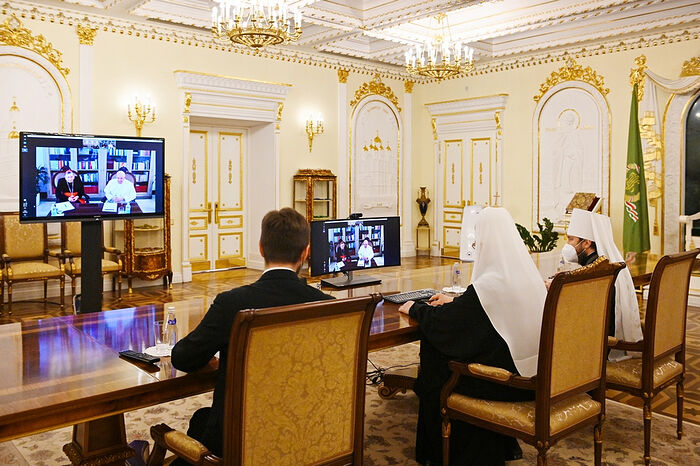POPE AND DECR COMMENT ON PATRIARCH KIRILL-POPE CHAT IN MARCH
Moscow, May 4, 2022
 Pat. Kirill and Pope Francis spoke via Zoom in March. Photo: mospat.ru
Pat. Kirill and Pope Francis spoke via Zoom in March. Photo: mospat.ru
Pope Francis and the Moscow Patriarchate’s Department for External Church Relations disagree about how to characterize the conversation held between Patriarch Kirill and Pope Francis on March 16.
The DECR reported at the time that “the talk included a detailed discussion of the situation on Ukrainian soil. Special attention was paid to the humanitarian aspects of the current crisis and the actions of the Russian Orthodox Church and the Roman Catholic Church for overcoming its consequences. The parties underscored the utmost importance of the ongoing negotiation process, expressing the hope that a just peace would be achieved as soon as possible.”
According to Vatican News, their talk centered “on the war in Ukraine and on the role of Christians and their pastors in doing everything to ensure that peace prevails.”
“The Pope said, in agreement with the Patriarch, that ‘The Church must not use the language of politics, but the language of Jesus,’” the official Catholic outlet noted. Both sides also agreed that “the Churches are called to contribute to strengthening peace and justice.”
In an interview with the Italian outlet Corriere Della Sera yesterday, the Pope recalled the conversation, with a different emphasis than the Vatican reports:
I spoke to Kirill for 40 minutes via zoom. For the first 20 he had a card in hand, reading me all the justifications for the war. I listened and told him: I don’t understand anything about this. Brother, we are not clerics of the state; we can’t use the language of politics, but that of Jesus. We’re shepherds of the same holy people of God. For this we must seek ways of peace, to put an end to the firing of weapons. The Patriarch can’t transform himself into Putin’s altar boy.
The DECR issued a response to the Pope’s remarks today, stating: “It’s regrettable that a month and a half after the conversation with Patriarch Kirill, Pope Francis chose the wrong tone to convey the content of this conversation. Such utterances can hardly further constructive dialogue between the Roman Catholic and Russian Orthodox Churches, which is so necessary at the current time.”
The statement then quotes Pat. Kirill from the March conversation with the Pope:
I thank you for the opportunity to hold this meeting. When we met in 2016 in Cuba, I said to you that we were meeting at the right time and in the right place. And although our communication is being held through the use of long-distance technology, I still believe that we are once more talking to each other at the right time. With your permission, I would like to share with you my perception of the present-day difficult situation. Of course, we live in different informational spaces: the Western media has either remained silent or said practically very little on those facts which I would like to draw your attention to.
The Russian primate emphasized that the conflict began with the Maidan events in Kiev in 2014, and drew special attention to the tragedy in Odessa in May 2014, when Nazi groups burned Russian-speakers alive in the Trade Union House.
The Patriarch also told Pope Francis about how NATO promises not to expand eastward after the fall of the Soviet Union were broken.
“An extremely dangerous situation had risen as a result in that the borders of NATO were now within 130 kilometers of St. Petersburg and the time it takes for a rocket to reach the city is a few minutes. Had NATO received Ukraine into its membership, then the time it would take for a rocket to reach Moscow would also be a few minutes. Russia could not and cannot permit this,” the DECR statement reads, summarizing the words of Pat. Kirill.
The DECR also quotes the Patriarch’s concluding remarks about the pain of his flock suffering on both sides:
Of course, the present situation causes me great pain. My flock is on both sides of the conflict and most of them are Orthodox people. Part of the opposing side is from your flock. I would like therefore, leaving the geopolitical aspect to one side, to pose the question of how we and our Churches can influence the situation? How can we act together to bring peace to the hostile parties with the single aim of establishing peace and justice? It is very important in these conditions to avoid further escalation.
The Vatican News reports accurately conveyed that the Pope and Patriarch agreed about using the language not of politics but of the Gospel, and about the importance of the ongoing negotiation process, the DECR statement concludes.


No hay comentarios:
Publicar un comentario